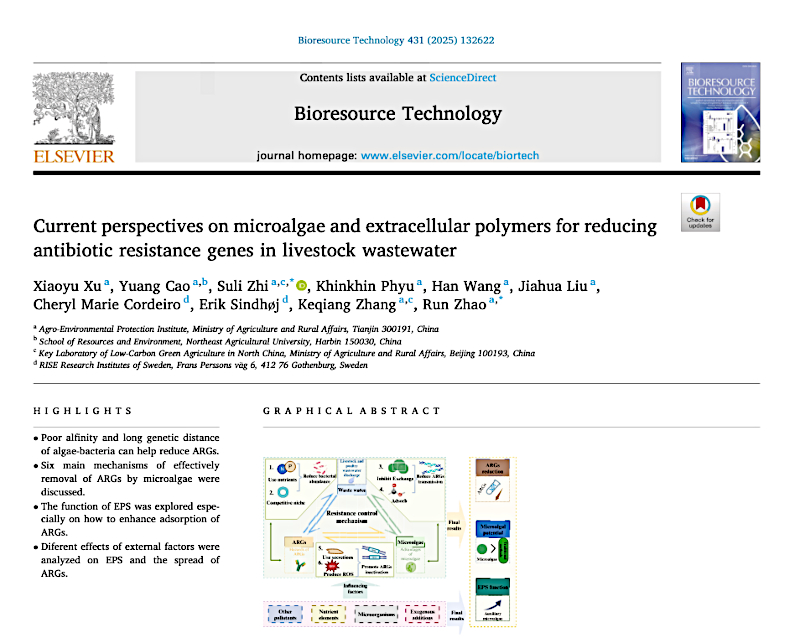

Antibiotic resistance is one of the most pressing challenges in both environmental and public health domains. A growing body of research is exploring nature-based solutions to mitigate the spread of antibiotic resistance genes (ARGs), particularly in agricultural systems. A new study published in Bioresource Technology contributes to this field by examining the potential of microalgae and extracellular polymeric substances (EPS) to reduce ARGs in livestock wastewater.
🔗 Read the full article: https://doi.org/10.1016/j.biortech.2025.132622
Overview of the Study
The research, led by Xiaoyu Xu and a multidisciplinary team from China and Sweden, investigates the interactions between algae and EPS and their role in mitigating the spread of ARGs in contaminated livestock water. As the agricultural sector is a known hotspot for antibiotic use and discharge, developing effective treatment strategies is both urgent and impactful.
Key Contributions
The study presents several important insights:
- Microalgae–EPS Synergy: The researchers found that the combination of microalgae and their secreted polymers plays a significant role in reducing ARG concentrations. EPS can act as a natural adsorbent, binding and immobilizing genetic materials that otherwise spread resistance traits.
- Six Mechanisms Identified: The authors outline six mechanisms by which microalgae can reduce ARGs, including adsorption, degradation, and physical isolation. These mechanisms suggest a multi-layered potential for algae-based wastewater treatment systems.
- Role of EPS in Adsorption: The function of EPS in enhancing the adsorption of ARGs was explored in detail. Factors such as EPS composition, surface charge, and spatial arrangement were shown to influence their capacity to sequester genetic material.
- Environmental Factors Matter: External conditions like pH, nutrient load, and microbial community structure were found to affect the efficiency of ARG reduction, indicating that treatment performance can be optimized based on context.
Why It Matters
This study offers a low-impact, bio-based approach to a high-impact problem. As countries tighten regulations around antibiotic use and emissions, the findings provide a practical and scalable option for livestock operations, especially in regions lacking access to advanced wastewater treatment technologies.
Collaborating Institutions
The work is a product of collaboration among:
- Agro-Environmental Protection Institute, China
- Northeast Agricultural University, China
- Key Laboratory of Low-Carbon Green Agriculture in North China
- RISE Research Institutes of Sweden
Conclusion
This research advances our understanding of how natural biological systems can be harnessed for environmental remediation. With further development and field-scale validation, microalgae-EPS systems could become a cornerstone of sustainable wastewater treatment in agriculture.
📖 Full citation:
Xu, X., Cao, Y., Zhi, S., Phyu, K., Wang, H., Liu, J., Cordeiro, C. M., Sindhøj, E., Zhang, K., & Zhao, R. (2025). Current perspectives on microalgae and extracellular polymers for reducing antibiotic resistance genes in livestock wastewater. Bioresource Technology, 431, 132622. https://doi.org/10.1016/j.biortech.2025.132622